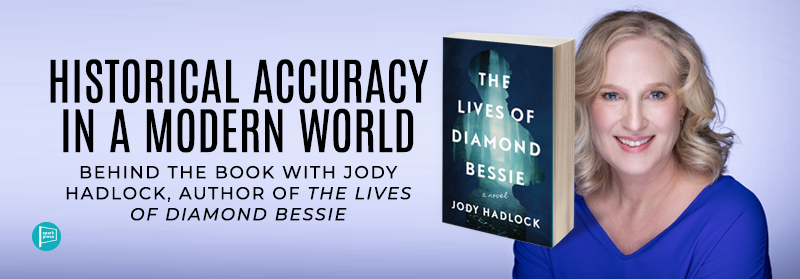
Like many novelists, I’d always wanted to write fiction, and I’ve always been fascinated by the 19th century, so it’s no surprise that my first novel is historical. When I learned of the story of Diamond Bessie, I knew I had found what I wanted to write. I also knew it would require research. But I had no idea how much would be needed. Let’s just say I was a bit naïve.
The Lives of Diamond Bessie is based on a real person and (mostly) true events, so I spent the first part of my research finding out everything I could about Bessie and the people she knew, as well as the murder investigation and legal case that were part of the story. I spent countless hours reading through hundreds of newspaper articles and sifting through court documents. I traveled to every place Bessie lived, including Ireland, where she was born. Unfortunately, every building associated with her story was long gone. But it was worthwhile to stand where Bessie once stood; to absorb the atmosphere and history of a place.
It was when I started to research life during the nineteenth-century that I realized I was woefully deficient in that area. Historical fiction requires more world-building than contemporary fiction (but less than science fiction and fantasy). On every single page of my novel there is a detail that needed to be researched. What did the brothels look like where Bessie lived? What did she eat? What did she wear? When she left the house, what did she see, smell, hear? What did laudanum, the drug of choice for many women in the 1800s, taste like? (Fortunately, because of Google, I didn’t need to actually drink the opium tincture myself.)
Every tiny detail fascinated me, but you don’t want to overwhelm readers with research. You need to weave in facts in an engaging way that keeps readers turning the page, which is harder than it may seem. That’s where the famous saying “kill your darlings” comes into play.
Setting is important in historical fiction, but so is the language. There were many words used in the 19th century that are obsolete or forbidden today. For example, the word inmate had a much broader definition than it does now. It used to also mean “several occupants of a house.” And a house could be any place where people lived, not just a prison: a boardinghouse, a convent, an asylum. Early readers of my manuscript were confused by my more expansive use of inmate, so I had to address that.
And what about words that were common in the 1800s but are offensive now? I don’t use the N-word. Ever. And it wasn’t going to appear in my novel. But what about Negro? It’s not quite as offensive, but it still makes me squirm. There’s a nifty tool, Google Ngram Viewer, that can tell you a lot about the popularity of language that was used during a particular time. But only in recorded writing, not in speech. The word Negro was very common during the time period of my novel, the 1860s and 1870s. In fact, it was commonly used through the 1960s. African American was not in use at all in the 1800s, so I couldn’t use that. In the end I decided to use Negro when a southerner was referring to a Black person. Bessie was from the North, so she used Black. It’s a subtle difference, but the choice I made to maintain that historical accuracy.
In the nineteenth-century there were opium dens all over the country and the vast majority were owned by Asians. When Bessie visits one, I was faced with the dilemma of how to refer to the proprietor. I didn’t want to use Chinaman, which is not acceptable today but was back then. Luckily, using the Ngram Viewer, I found that, in the 1800s, Asian was used interchangeably with Chinaman.
Colloquialisms can also pose problems. Sayings once popular more than a hundred years ago may not only be obsolete today, but their meanings may also not be apparent. In my research, I learned that one of my characters, a sheriff, used the phrase, “Murder will out.” I eventually understood its meaning, but readers only have a moment when they’re reading your work to “get” what you’ve written. If something makes a reader confused, then they’re taken out of your story, and you don’t want that. “Murder will out” basically means that a criminal will eventually be exposed, and that’s what I had the sheriff say to explain the obscure saying.
It’s a balancing act to maintain historical accuracy, while also transporting your readers to a different century without it seeming completely alien to them, or too modern. Pay attention to the details, but don’t let them overwhelm or obfuscate what readers most want: a story.

Leave A Comment